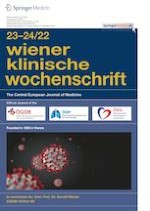27.10.2022 | original article
Early administration of remdesivir may reduce mortality in hospitalized COVID-19 patients
A propensity score matched analysis
Erschienen in: Wiener klinische Wochenschrift | Ausgabe 23-24/2022
Einloggen, um Zugang zu erhaltenSummary
Background
Remdesivir is the only antiviral agent approved for the treatment of hospitalized coronavirus disease 2019 (COVID-19) patients requiring supplemental oxygen. Studies show conflicting results regarding its effect on mortality.
Methods
In this single center observational study, we included adult hospitalized COVID-19 patients. Patients who were treated with remdesivir were compared to controls. Remdesivir was administered for 5 days. To adjust for any imbalances in our cohort, a propensity score matched analysis was performed. The aim of our study was to analyze the effect of remdesivir on in-hospital mortality and length of stay (LOS).
Results
After propensity score matching, 350 patients (175 remdesivir, 175 controls) were included in our analysis. Overall, in-hospital mortality was not significantly different between groups remdesivir 5.7% [10/175] vs. control 8.6% [15/175], hazard ratio 0.50, 95% confidence interval (CI) 0.22–1.12, p = 0.091. Subgroup analysis showed a significant reduction of in-hospital mortality in patients who were treated with remdesivir ≤ 7 days of symptom onset remdesivir 4.2% [5/121] vs. control 10.4% [13/125], hazard ratio 0.26, 95% CI 0.09 to 0.75, p = 0.012 and in female patients remdesivir 2.9% [2/69] vs. control 12.2% [9/74], hazard ratio 0.18 95%CI 0.04 to 0.85, p = 0.03. Patients in the remdesivir group had a significantly longer LOS (11 days vs. 9 days, p = 0.046).
Conclusion
Remdesivir did not reduce in-hospital mortality in our whole propensity score matched cohort, but subgroup analysis showed a significant mortality reduction in female patients and in patients treated within ≤ 7 days of symptom onset. Remdesivir may reduce mortality in patients who are treated in the early stages of illness.
Anzeige
